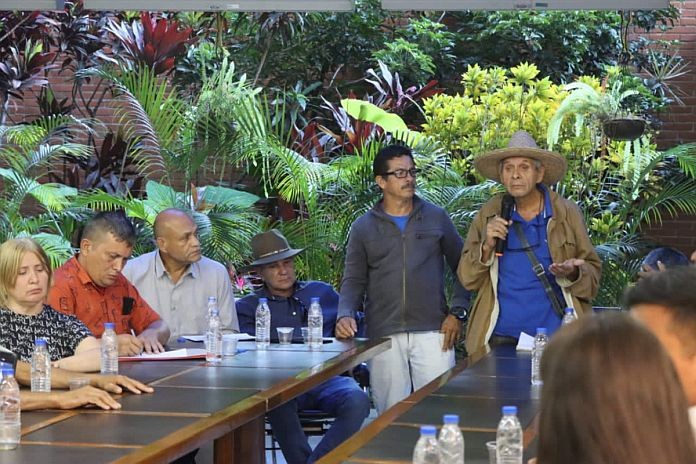By Ricardo Vaz
CARACAS, Venezuela, (venezuelanalysis.com) – Venezuelan campesinos mobilized in Caracas on Tuesday to demand state policies to protect small and midsize production.
The demonstration was mostly made up of coffee growers from the states of Lara, Portuguesa and Trujillo. The main demand is for the state to set a fair price for crops amidst efforts from large-scale distributors to pay below production costs.
Numbering around 200, the protesters requested to be heard at the country’s National Assembly (AN) but were initially blocked by a National Guard picket line. They staged an impromptu meeting and talked to the media before a group of spokespeople was received by a parliamentary commission.
Later on Tuesday, the campesino delegation held a meeting with agriculture minister Wilmar Castro Soteldo. However, according to Venezuelanalysis sources, the summit did not yield an agreement. A second conference is reportedly set for Thursday, featuring distribution and retail businesses as well, in an attempt to establish crop prices.
During the morning rally, campesino spokesman Toribio Azuaje told Venezuelanalysis that a failure to set fair prices could “bankrupt coffee producers.”
“The country is living through a crisis and a blockade, plus coffee prices have fallen internationally,” stated the grassroots leader from Biscucuy, in the mountainous region of Portuguesa state. “So we are calling for emergency measures from the government to protect producers.”
In discussions and statements to media outlets, campesinos expressed frustration that two rounds of negotiations earlier this month, featuring the agriculture ministry and the state-owned Venezuelan Coffee Corporation, yielded agreements that were quickly reneged upon.
The latest accords set prices between US$220 and $240 per cental of coffee (100 lbs or 46 kilograms), depending on the quality. Azuaje stressed that “with current production costs, that is the bare minimum so we do not sell at a loss.” Coffee buyers are reportedly offering as little as $170 per coffee cental.
Azuaje went on to lament a lack of organization among small-scale coffee producers which makes it harder to bargain and unify demands. According to the veteran campesino, coffee growers are often forced to strike deals with their respective municipal commerce chambers to sell their crops.
Another issue raised by protesters was the large influx of coffee from Colombia through irregular channels in what they deem as unfair competition. A number of corn producers were likewise present at the demonstration and expressed a similar concern.
Alfredo Mendoza, also a coffee producer from Portuguesa state, affirmed that the protest “represented the voice of 100,000 families” in precarious conditions due to the price uncertainties.
“We feel cheated, because twice now we’ve agreed on prices only to see the coffee industry make a mockery of them,” he told Venezuelanalysis. “We’ve come here to tell the government that ‘enough is enough’ and we need serious policies to protect campesinos’ dignity.”
Mendoza additionally talked of a “miracle” that sees private intermediaries buy coffee at second-rate prices only to then sell the processed version as “gourmet” with huge profit margins. “This gap is unfair,” he concluded.
Faced with crushing US sanctions, the Nicolás Maduro government has turned to increasingly liberal measures in an effort to stabilize and recover an economy that has seen GDP contract by three quarters over the past seven years.
In the Venezuelan countryside, campesinos have seen production costs soar as a result of a growing privatization that has affected seed and input supplies as well as access to tractors. In addition, the government gradually withdrew subsidies to set crucial diesel fuel at 50 cents per liter, a price deemed unaffordable for many small and midsize producers.
Campesino collectives have denounced that the new scenario favors large landowning and agroindustry interests. There have likewise been complaints about the use of GMO seeds in violation of the 2015 Seed Law.





